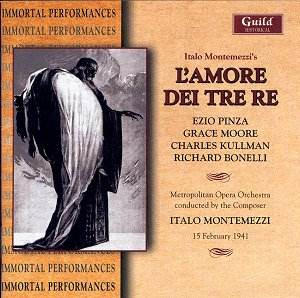This performance has appeared in various guises since
the days of LP. Some years ago I tried to listen to an earlier manifestation
and gave it up, impatient of the poor sound. So the first good news
here is that I was able to listen right through and with considerable
enjoyment. Yes, the orchestra is a bit tinny at times and there is the
odd bit of grit, but the voices are clearly heard and the dynamic variety
wrought by the composer as conductor is there to be heard and enjoyed.
It is, however, the singing of Ezio Pinza as the blind King Archibaldo
that makes this performance a must for lovers of Italian opera. There
is also the bonus of five arias, from various sources, sung by the great
basso cantante.
The opera was first performed, to mixed reviews, at
La Scala on April 10th 1913. However, it really took off
the following year at the ‘Met’ under Toscanini’s baton. The story concerns
Fiora (sop) who, for political reasons, has been forced to marry Manfredo
(bar), the son of the blind King Archibaldo (bass). Whilst her husband
is away fighting a campaign on behalf of his father, Fiora takes a lover
(ten). She refuses to reveal the identity of her lover when caught unawares
by her blind father-in-law and he strangles her (CD2 tr2). Knowing her
lover will return to her he smears poison on her dead lips. His plan
succeeds, not only for her lover, but also his son, as both kiss her
lips in farewell.
Whilst it is the presence and singing of Pinza that
is the great calling card of this performance, the others in the cast
do not let the side down. Grace Moore, also known as a sexually alluring
film star, is reputed to have got her Met contract as a consequence
of her impact on Otto Kahn, President of the Met Board. I was pleasantly
surprised at the fullness of her tone and range of expression, whilst
Kullman’s plangent, but not very individual voice, and the strong toned
baritone, fulfils what is required adequately, albeit with no special
distinction. It is distinction that Pinza brings to his interpretation.
He is full toned, powerful, smooth of legato and without any spread
of tone as the voice rises to dramatic climax (CD 1 tr5). His ability
to convey the many emotions of the King, frustration, rage, despair,
by vocal nuance, phrasing and colour is a pleasure to listen to. It
is also the rich nut-brown centre of the voice, and its smooth mellifluous
tone that so seduces my ear.
The bonus tracks, titled ‘Pinza Rarities’, include
a short interview with the singer from 1947, and range over a twenty-year
period of the singer’s career. They cover a variety of genre and illustrate
the qualities referred to as well as an amazing consistency of singing
quality. Pinza’s Fiesco of 1947 (CD2 tr 17) is fiercely implacable;
the concluding note set the (remaining) hair of this cool critic on
end! In contrast his ‘Ombra mai fu’ of 1944, is smooth and serene.
This is as good as it gets with recordings from this
source and period. Restorer Richard Caniell, who is also the author
of the informative booklet notes, artist profiles, track related synopsis
etc. is to be congratulated. Caniell also indicates that more performances
featuring Pinza will follow. I for one cannot wait.
Robert J Farr
